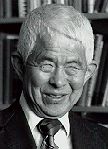 A long time ago, when I had just started teaching at the University of Rochester, a blind man marched into my office, adopted a commanding stance, and announced in a booming voice that “it takes 150 condoms to prevent one birth in India”. Then he turned on his heels and marched out, leaving me to wonder what he had divided into what to get that number.
A long time ago, when I had just started teaching at the University of Rochester, a blind man marched into my office, adopted a commanding stance, and announced in a booming voice that “it takes 150 condoms to prevent one birth in India”. Then he turned on his heels and marched out, leaving me to wonder what he had divided into what to get that number.
That’s what it was like working with Walter Oi, who died peacefully in his sleep on Christmas Eve after a long illness. Walter loved odd facts, and he loved to share them. It was Walter who told me that when all frozen pies had 12 inch diameters, apple was the most popular flavor — but when 7 inch pies came on the market, apple immediately fell to something like fifth place. His explanation: When you’re buying a 12 inch pie, the whole family has to agree on a flavor, and apple wins because it’s everyone’s second choice. With 7 inch pies, family members each get their pick, and almost nobody chooses apple.
Walter loved facts so much that he sometimes invented new ones, because the world could always use more. One day he walked into the department coffee room and announced that “A one hundred pound man and a three hundred pound man have exactly the same quantity of blood.” When this was met with considerable skepticism, Walter responded as he always responded to skepticism — by repeating himself more forcefully: “A one hundred pound man and a three hundred pound man have EXACTLY the same quantity of blood”.
In those pre-Internet days, some of us owned a device called an “encyclopedia”, which was sort of like a hardcopy printout of Wikipedia, but with fewer Simpsons references. A couple of my more enterprising colleagues went home and checked their encyclopedias that night, and came back the next morning to report that according to authoritative sources, a man’s blood volume is roughly proportional to his body weight. Walter’s response: “Nope. A one hundred pound man and a three hundred pound man have EXACTLY the same quantity of blood.”
If you watched carefully and didn’t blink, you might have caught him suppressing a smile.

